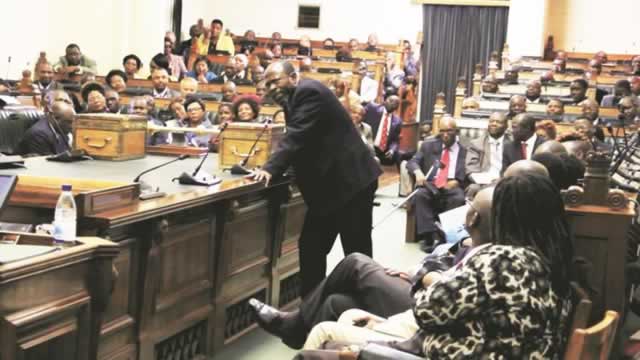MDC-T commits political suicide


The decision by MDC-T not to participate in by-elections is a clear sign that the party is at its weakest point. It will not be able to influence anything in the body politic
Zvamaida Murwira Mr Speaker Sir
If they carry out their decision to pull out all the Members of Parliament from the august House, as what they have been claiming to be considering, the figure will rise drastically as Zanu-PF will pocket all the money due to political parties under the Act.
MDC-T has committed political suicide after it turned out that by deciding not to participate in by-elections this year, it will not only cost them their seats but will also bite into the opposition party’s pocket as they will surrender funds they were entitled to under the Political Parties (Finance) Act.
This is in addition to the fact that the opposition party, by boycotting by-elections, has abandoned the tenets of democracy which formed the crux for the existence of any political party worth its salt.
The question that any progressive person would ask is what would then be the basis for its continued existence as a political party if it is shying away from elections?
How does it envisage attainment of power as a political outfit if it abandons the very fundamental aspect of democracy, that of elections, if it wanted to be taken seriously?
Obviously, this gives credence to the view that the MDC-T noted that it was at its weakest point to mount a formidable election challenge to Zanu-PF since it was still smarting from a painful split which saw key party members led by former secretary general Mr Tendai Biti and national treasurer, Mr Elton Mangoma forming MDC Renewal.
There will be a heavy price not to contest in by-elections to defend their seats in that it will inevitably have financial implications on the opposition party.
Zanu-PF and MDC-T, as the dominant political parties, have over the years been sharing money proportionately under the Political Parties (Finance) Act.
The election boycott decision has the effect that MDC-T will lose about $200 000 per year of its entitlement for the next three years, a figure that might cumulatively translate to almost $600 000 by 2018 when general elections will be due.
If they carry out their decision to pull out all the Members of Parliament from the august House, as what they have been claiming to be considering, the figure will rise drastically as Zanu-PF will pocket all the money due to political parties under the Act.
It is common cause that the MDC-T is running on a shoe string budget and in most cases its workers have gone for some months without being paid.
The funds under the Act, though nominal, give them a head-start in financing political activities including funding election campaigns.
Zanu-PF will be smiling all the way to the bank as it gets all the allocated money, something that shows the futility of the MDC-T’s decision as constituting political suicide.
While the decision to forego the money might not be noticeable by ordinary party supporters, it is the decision to boycott by-elections that will inevitably send the opposition party to its political grave. Another aspect is the apparent hypocrisy by the MDC-T on how it dealt the issue.
On one hand the party has chosen not to contest by-elections in 14 constituencies but it will still fill the vacancies in proportional representation seats.
Some have argued that both processes were by-elections by different names. The difference is that one set is contested and the other is not.
The party has chosen to boycott the contested ones but elected to fill the uncontested ones.
United Kingdom-based MDC-T official and former director in the Prime Minister’s office, Dr Alex Magaisa has slammed the opposition party describing their decision to boycott by-elections as a half-hearted protest.
In his blog, Dr Magaisa reminisced on a post-caucus meeting held by the party in the wake of a heavy defeat at the hands of Zanu-PF in the July 31 2013 harmonised elections.
He questioned the decision by the MDC-T to take up parliamentary seats of a process which they were denouncing as lacking legitimacy after the harmonised polls.
“If we were going to participate in Parliament it would make our case weaker in our engagements with the region and the international community, to whom we were saying the election was illegitimate.
“How could they take our protest seriously when at the same time we were happy to accept the seats from an election which we were saying was rigged and illegitimate?
“It was a contradiction that I did not believe reconciled in our favour. However, this view was in the minority,” said Dr Magaisa in his blog.
He slammed the MDC-T for going to Parliament after the harmonised polls when it was claiming that the process was flawed.
“My biggest problem was that participation in Parliament signalled a half-hearted protest, a weak protest which would signal legitimation of the process about which we were complaining,” said Dr Magaisa.
Dr Magaisa said MDC-T MPs were not willing to boycott Parliament because of the perks that went with that status.
“If we were unhappy with the election, we had to make important sacrifices to make that point. Everyone had to make those sacrifices. But the party was not prepared to do that. I was therefore not surprised when SADC and the AU did not take our protests seriously,” he said.
“The decision of the party not to contest in the by-elections, while taking up the remaining seven proportional representation seats and remaining part of the parliamentary processes, will therefore not yield much by way of protest.”
Mr Speaker Sir, quite clearly the MDC-T wants to cover its ill-preparedness for elections under the guise that the political environment is not conducive.
This is despite the fact that it has been contesting elections under the same conditions and in March 2008 it was willing to accept the result in which it led the polls before Zanu-PF overturned it in June 2008 through a resounding election victory.
MDC-T appeared to be of the mistaken view that people are naïve to swallow hook, line and sinker its dummy that the environment was not conducive when it is self-evident that its house is not in order.
The departure of its key members and a significant number of legislators rattled the opposition outfit so much that it is still struggling to come to terms with what happened for it to focus on by-elections.
The earlier the opposition realised that people are now wiser the better.







Comments